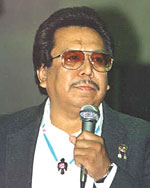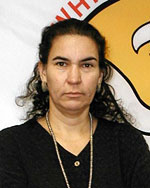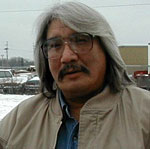| Reports of civil rights violations on Minnesota's Indian reservations have been persistent for years. Indians have filed scores of complaints to state and federal agencies, saying they live under a system where political patronage and nepotism rule the day and tribal leaders can manipulate the legal system to benefit themselves and their supporters. The past few years have brought major reforms in tribal government, but there is still a lingering mistrust.
 |
Red Lake Tribal Chairman Bobby Whitefeather says he has tried to make the tribal court system more responsive to the civil rights of band members. Critics say the situation is still far from ideal.
|
THE UNITED STATES CONSTITUTION stops at the borders of Indian Country. The U.S. Supreme Court ruled more than 100 years ago that the document does not apply to Indians living on reservations. Legal rulings since then have established it's up to tribal governments to protect basic civil rights that non-Indians take for granted. If tribal governments abuse that responsibility, victims have few places to turn.
The Red Lake Indian Reservation in northern Minnesota has had a tribal court for more than a century. Chairman Bobby Whitefeather says the court does its best to protect the civil rights of band members. He admits that wasn't always the case.
"Previously, dissension was something that was not well tolerated by the administration at that point in time," he says.
Whitefeather is referring to the 32-year reign of former chairman Roger Jourdain, whose administration controlled a court that according to a 1986 Star Tribune investigation, denied jury trials, jailed people for days without specifying charges, and denied prisoners the opportunity to post bail. In 1982, Jourdain and the tribal council effectively barred lawyers from tribal court, unless they could speak the native language.
"I think 'fluently' was also inserted in there. And even to this day, I don't know of any legally licensed attorney that possesses those qualifications. And so, in a way, that restricted access to law trained legal council," says Whitefeather.
Whitefeather says changes in the late 1980s led to a court system that is more responsive to the civil rights of band members. But former reservation resident Clara Niska says things are far from ideal. Niska is of Indian descent but is not from Red Lake. She moved there in the 1970s and later married Wub-E-Ke-Niew, a member of the band and one of the founders of the controversial American Indian Movement. Niska says she and her husband suffered years of persecution for their political beliefs, and when he died in 1997, she was abruptly and forcibly exiled.
"They kicked me out of my house a week after he died, with the clothes on my back, pretty much," says Niska.
 |
"Sovereignty is a matter of 'use it or lose it.' We need to set out the parameters of our jurisdiction and guard it very jealously," says White Earth tribal judge Anita Fineday.
(MPR Photo/Tom Robertson)
|
It happened in a Red Lake courtroom where Niska was attending a probate hearing to settle her husband's estate. She says tribal police walked in with an order of exclusion signed by the chairman. She was escorted to the reservation border and told never to come back. She left behind her car, her home and all of her belongings. She says her civil rights were never considered.
"There's times when I've stood on the line and looked across and yearned for the land that I may never see again. It's a coldhearted thing to say you can't even visit your husband's grave," Niska says.
Chairman Whitefeather says his action in the Niska case was legal under tribal law, and was justified to protect what he calls the "tranquility of the reservation."
"She was removed because she was creating dissension amongst other people here. She was creating a problem. As a sovereign nation, we have the authority and the ability to establish the parameters of the rights of our people," says Whitefeather.
Congress gave Indians most of the protections of the Bill of Rights in the 1968 Indian Civil Rights Act. But 10 years later, the Supreme Court sharply limited the impact of that legislation, ruling that tribal sovereignty gives them authority over internal affairs. And tribes are increasingly using that sovereignty to broaden the scope of their courts.
On the White Earth Indian Reservation in northwestern Minnesota, Chief Judge Anita Fineday oversees a court that functions on a shoestring budget but owes its existence to the influx of casino profits. Just a few years ago the court handled only hunting and fishing cases. Now its jurisdiction is greatly expanding.
"I always feel like sovereignty is a matter of 'use it or lose it.' We need to set out the parameters of our jurisdiction and guard it very jealously," she says.
The court's caseload has doubled in the past year. It now handles misdemeanor traffic violations, child protection and a variety of civil cases. Soon it will take on juvenile justice and domestic violence codes. Fineday says one of the more popular new services, with Indians and non-Indians alike, is a cheap divorce.
"I make the pitch this is the only place in Minnesota you can get a divorce for $25 in one week, so we're seeing an influx of people," Finday says.
But White Earth's court system is built against a dismal backdrop of repression and corruption. The 20-year regime of former Chairman Darrell "Chip" Wadena, which ended in 1996, included a host of abuses: political favoritism, embezzlement, fraud and stolen elections. Judge Fineday admits there were civil rights abuses on a massive scale.
"The judge did what the tribal council wanted done, and if the tribal judge did something that the tribal council didn't like, they lost their job. If the tribal council didn't like you, you didn't get a job, you didn't get a house. The system was corrupt to its core," says Fineday.
Trusting in a government with that kind of past is hard to do, says band member Ray Bellecourt. He believes there are no civil rights on his reservation, and nowhere to turn for help.
 |
White Earth activist Marvin Manypenny says tribal councils have too much influence over tribal court systems. "You might as well have kingdoms, you know, a king making all the decisions for you. We demand participatory democracy," says Manypenny.
(MPR Photo/Tom Robertson)
|
"When your rights are violated up there, you've got one place to go - to the people that are violating it. And they're not going to act on it. It's like asking the gorilla to get off your back. It's not going to happen," says Bellecourt.
Some say the problem lies with the constitution of the Minnesota Chippewa Tribe, an organization that includes White Earth and five other Ojibwe bands. Critics, including White Earth activist Marvin Manypenny, say the constitution is flawed because it does not include a separation of powers. Manypenny says it gives tribal councils unbridled power.
"You might as well have kingdoms, you know, a king making all the decisions for you. We demand participatory democracy," Manypenny says.
So far, reformists have had no luck in changing the constitution. But tribal leaders are working to insulate the courts from interference. At White Earth, tribal judge Anita Fineday says she can no longer be fired by the tribal council. Her judgeship, for the first time in history, will be up for election in 2002.
Fineday says many Indians find the criminal justice system intimidating and unfair. She says White Earth's court provides more opportunity to be heard, and is more sensitive to Indian culture.
"I think there's a great deal of bias in the state court system. I think that for anyone who is poor and who is a minority, it is difficult to receive justice in the state or federal system. I think we provide better civil rights protections," says Fineday.
Tribal officials agree the rapid growth of their judicial systems will play a key role in further promoting self-governance and political stability. Many also see the institutions as vital to protecting the civil rights of a people that historically have had none. |